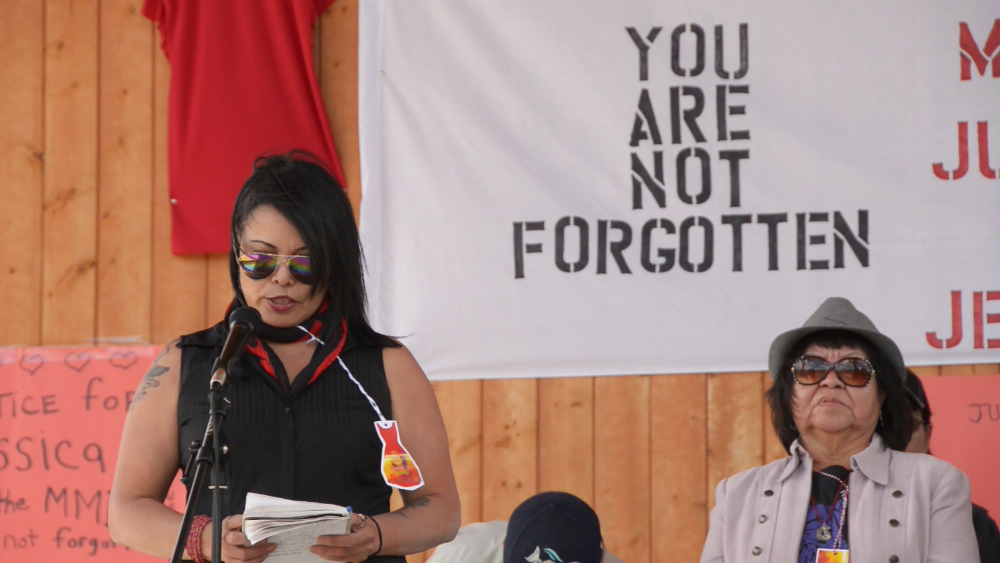When her 18-year-old cousin went missing in Smithers last year, Jacquie Bowes didn’t know where to turn.
Jessica Patrick, from the Lake Babine Nation, was last seen on Aug. 31 in the northern B.C. forestry town. When she hadn’t returned to pick up her one-year-old daughter three days later, her family knew something was wrong.
“She was always in contact with her daughter,” Bowes says.
Bowes filed a missing person report with the RCMP and shared Patrick’s photo on social media. She enlisted family and close friends to search for her cousin, and they spent evenings and weekends combing the area around Smithers.
After two weeks, Bowes’ mother and stepfather discovered Jessica’s body on a steep roadside embankment outside Smithers.
“Everybody was crying and shaking,” Bowes says. “It was just my close work associates and my family, and we found her.”
The family still doesn’t know what happened. The RCMP major crime unit assigned to her case has told them it is being treated as a homicide, but no charges have been laid and no cause of death has been released. Bowes said they were told they would have answers in March, which became April, and then May. Now investigators have stopped responding to her inquiries.
For nine months, they have been waiting for answers.
Policing the pipeline
So when Bowes, a member of the Wet’suwet’en Nation, watched a stream of RCMP vehicles drive into her hometown of Houston in early January, she took notice. The police arrived in response to a peaceful Gidumt’en protest camp 44 kilometres south of Houston on the Morice West Forest Service Road. The camp was slowing work on TransCanada’s Coastal GasLink pipeline.
Where were police when her cousin was killed, she wondered?
“When Jessica’s search happened, I didn’t see a single officer helping us. Yet they can send a whole army out to Kilometre 44,” Bowes said. “What appalled me was how many officers there were.”
On Jan. 7, police enforced a court injunction by storming the camp and arresting 14 people on civil charges that were later dropped.
Several days later, after a meeting between Wet’suwet’en hereditary chiefs and RCMP, a second roadblock 20 kilometres farther down the Morice Forest Service Road at the Unist’ot’en Healing Centre was peacefully removed.
And the RCMP announced a temporary detachment or “Community-Industry Safety Office” would be constructed on the forestry road “to ensure the safety of the individuals at the Healing Centre and of CGL employees.”
Five months later the detachment remains, with the equivalent of 16 full-time officers, according to Wet’suwet’en hereditary chief Na’Moks. RCMP would not confirm the number of officers stationed at the detachment.
“They’ve put more money into watching us, labelling us and monitoring us than into searching for local murdered and missing women,” says Na’Moks, whose English name is John Ridsdale. “They’re out there 24 hours a day, seven days a week, and they’re not helping our people.”
Dylan Mazur, a community lawyer with the BC Civil Liberties Association, says northern B.C. communities often complain they are “over-policed and under-protected.”
And an investigation by the Civilian Review and Complaints Commission for the RCMP found the concerns were justified.
Its 2017 report on policing in northern B.C. noted 46 per cent of missing persons cases were not investigated “promptly and thoroughly” as required by RCMP policy. Almost half — 49.4 percent — of missing cases for people labelled “high-risk” weren’t properly investigated.
Which makes the RCMP’s huge commitment of resources to shut down the Unist’ot’en protests indefensible, says Molly Wickham of the Gidumt'en Clan of the Wet’suwet’en Nation. She lives in the area and regularly interacts with officers.
“It’s really an abuse of their power and an abuse of the resources that are needed elsewhere, like searching for missing women,” she says. “It’s a slap in the face to any family in our community that is trying to find their loved one.”
Wickham was one of the 14 protesters arrested Jan. 7. She says Wet’suwet’en people travelling the Morice West Forest Service Road near the protest site are regularly ticketed for infractions like cracked windshields, and community members’ vehicles parked on the roadside while they are on the territory have been towed. RCMP regularly film Indigenous people in the area, Wickham says, including youths harvesting poles for a sweat lodge and elders conducting a medicine walk.
But drinking drivers appear to go unnoticed, she says. This month a truck driver stopped at the protest camp long enough to throw a beer can at Wickham’s husband before speeding off.
“They don’t stop anybody else. They don’t stop forestry. They don’t stop any of the Coastal GasLink workers. They only stop Wet’suwet’en and our supporters,” she says.
RCMP Cpl. Madonna Saunderson said members have responded to calls from people on all sides of the dispute. Most complaints and enforcement have been related to traffic safety, she said.
“The police officers working out of the C-ISO [Community-Industry Safety Office] are general duty police officers and have undergone cultural awareness training provided by elders, including a clan chief, on the Wet’suwet’en traditions,” Saunderson said. “They also receive enhanced training in conflict resolution.”
She added that the detachment would stay in the area as long as the RCMP considers it necessary.
Missing women and man camps
The RCMP’s work ensures the pipeline will go ahead, bringing camps that house hundreds — perhaps thousands — of workers from outside the region.
And that poses a danger to Indigenous women.
This month’s final report of the National Inquiry into Missing and Murdered Indigenous Women and Girls dedicates a chapter to resource extraction projects and their impact on Indigenous women.
Transient workers housed in “man camps” are a major concern, the report noted. High-paying, high-stress jobs contribute to an increase in drug and alcohol abuse, sexual assault and domestic violence.
“This increased rate of violence is largely the result of the migration into the camps of mostly non-Indigenous young men with high salaries and little to no stake in the host Indigenous community,” the report found.
Governments and resource companies “should do a more thorough job of considering the safety of Indigenous women and children when making decisions about resource extraction on or near Indigenous territories,” the report concludes.
On its website, Coastal GasLink acknowledges concerns around the social impacts of camps housing up to 800 workers.
“These facilities are designed to the highest standard and will be operated to ensure safe communities,” the company says.
The company website notes that one of the camps — located within 20 kilometres of the Unist’ot’en Healing Centre — will not allow alcohol.
Clinging to hope
Bowes is already seeing a change in her community. The pipeline has heightened existing racial divisions, she says, and there are more drugs. She no longer feels safe, and worries what an influx of transient workers might mean for the town.
The RCMP’s Saunderson said the investigation into Patrick’s death “continues to be a priority and is active and ongoing.”
And Bowes clings to that promise.
“They told us Jessica’s case is first priority,” she says. “I’ve been dwelling on hope. I’ve been trying to bite my lip and trust the process.” ![]()
Read more: Indigenous, Energy, Rights + Justice, Environment

















Tyee Commenting Guidelines
Comments that violate guidelines risk being deleted, and violations may result in a temporary or permanent user ban. Maintain the spirit of good conversation to stay in the discussion.
*Please note The Tyee is not a forum for spreading misinformation about COVID-19, denying its existence or minimizing its risk to public health.
Do:
Do not: